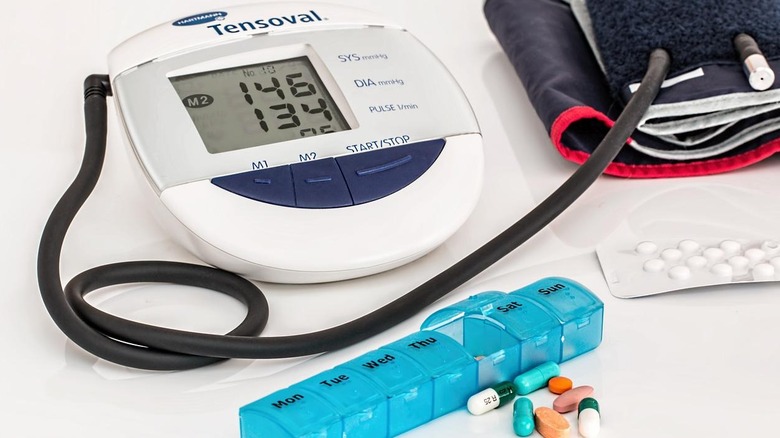Can Collagen Help Lower Blood Pressure?
High blood pressure (hypertension) affects nearly half of adults in the United States, putting them at risk for heart disease, stroke, and a wide range of other ailments. In 2020 alone, nearly 700,000 of deaths in the U.S. were attributed to hypertension as a primary or secondary cause. However, only one in four of adults who live with hypertension have the condition under control (via the Centers for Disease Control and Prevention).
Blood pressure is the force of blood pushing against your arteries as it travels from your heart to other areas of your body. When you have hypertension, that pressure increases and can lead to artery damage and a host of other ailments. Many people don't realize they have it, and hypertension can cause damage to your body for years before it is discovered (via the Mayo Clinic). There are numerous treatments for high blood pressure, including changing your diet, quitting smoking, and staying active (via Healthline). If the condition is more serious, your doctor may prescribe medication, such as valsartan, amlodipine, or a combination of different drugs.
There are also a number of home remedies that people have tried, including potassium-rich foods and essential oils. However, another potential weapon in the war against hypertension is also out there: collagen. While collagen is most commonly considered a supplement for skin and joints, there have been indications that it may have even more benefits than previously thought. Can it help fight hypertension?
How does collagen help the body?
Collagen is a protein that comprises 30% of your body's protein and is the primary component of your skin, muscles, and connective tissues. It plays a number of different roles, including helping to replace dead skin cells, giving your skin elasticity, and helping your blood clot (via the Cleveland Clinic).
Given its critical role in maintaining your body, some see the benefits of oral collagen supplements. A 2017 study published in the Journal of Cosmetic Dermatology suggests that collagen supplements may help improve brittle nails, while a 2019 study published in Nutrients indicates it might support skin elasticity. A 2018 study published in Nutrients also suggested collagen improves bone density. With so many positive properties, it stands to reason that collagen may have other benefits as well.
A 2006 study published in Current Opinion in Clinical Nutrition & Metabolic Care suggests that glycine, an amino acid that exists in collagen, can aid in reducing blood pressure when added to the diet. In a 2009 study published in Bioscience, Biotechnology, and Biochemistry, chicken collagen was given to hypertensive patients for four weeks. During that time, the patients experienced a significant drop in blood pressure. A similar 2013 study published in Bioscience, Biotechnology, and Biochemistry showed that hypertensive patients who were given collagen showed a reduction in arterial stiffness and an increase in nitric oxide, a compound that enhances blood flow.
The benefits of collagen are still being debated
The jury is still out on whether or not collagen is actually effective in fighting blood pressure. Research has shown that some people with hypertension have elevated levels of collagen in their blood (via the American Heart Association). Similarly, some researchers believe that high deposits of collagen in the heart and surrounding vessels could be a factor in vascular and cardiac morbidity (via the Journal of Hypertension). In both cases, the problems were caused by a buildup of collagen around the heart tissue, leading to stiffening of the tissue known as fibrosis.
This doesn't mean that a collagen supplement added to your diet will be deadly if you have hypertension — it simply means that you should not rely only on collagen to manage your hypertension symptoms. Rather than a cure-all for high blood pressure, it may or may not serve to simply alleviate some of the symptoms. As of now, the best treatment for hypertension remains a change in diet and lifestyle and, when warranted, medication. If you have hypertension or think that you may be hypertensive, consult your doctor and begin a course of treatment that works best for you.



